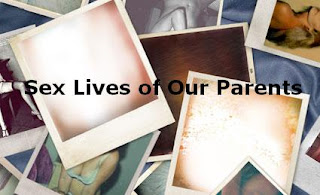Sex Lives of Our Parents

Sex Lives of Our Parents, written by Michael Mitnick and directed at Second Stage by David McCallum, is a character study of a young woman, Virginia, who “never wanted anything.” She is engaged to be married but is plagued by visions of her parents’ (particularly her mother’s) sexual history, which force her to finally figure out what she does want.
Sex Lives of Our Parents is a somewhat typical pre-wedding crisis of confidence story, but there was something more interesting going on here. I think because playwright Mitnick wasn’t so concerned with what happened but rather why it happened, we were able to delve deep into the characters without worrying about getting to the church on time.
And for Virginia, there seems to be a lot to delve into. Virginia is having visions, and while the play’s title suggests she’s seeing something graphic, in actuality her visions are less graphic and more instructive. Virginia (Virginia Kull) and her mother, Charlotte (Lisa Emery), have never really talked about life and love; they’ve mostly stuck to surface details. So when Virginia dreams about or has visions of her mother flirting or being otherwise engaged with a man other than her father (played by Daniel Jenkins), she starts to question the authenticity of their marriage. This, in turn, makes Virginia question her own upcoming nuptials to Jeff (an impressive Ben Rappaport).
You see, as her father explains to Jeff, Virginia was never a kid who wanted things. Mom and dad would buy her a new toy; she’d play with it because it was there; after a little while she would move on to the next thing that was there. And so when she finds herself engaged, she starts to wonder how she got there. She wonders if she’s engaged because Jeff asked or if she’s engaged because she loves him and wants to spend her life with him.
I found this to be interesting because it begs the question: How do you ever really know? You can plan and search and check off you list, and still things fall apart. You can make a thoughtless and rash decision and it can pay off in spades. So if a handsome, funny, “good guy” asks you to marry him do you say yes? (Didn’t Carrie Bradshaw talk about this when she was engaged to Aiden?)
I think what I really tuned into here is that it’s the woman who is unsure. We see Virginia and Jeff meet in a wonderfully directed “they meet, they fall in love, they get engaged” montage (sans dialogue), typical of romantic comedies (you know the kind: it’s a montage to show that time has passed and to quickly bring the audience up to date on the relationship). But as the play progresses, we see Virginia doubting her decisions.
Usually, men are depicted as the indecisive ones, the ones who need to “grow up.” But I like that here, it’s not a matter of growing up; it’s a matter of knowing yourself and taking control of your destiny. And we see this need for transformation personified by a woman. There are so many movies and TV shows (and plays and musicals) out there that present unrealistic and unattainable ideals for the way women are supposed to be behave in a relationship. It’s refreshing to see a woman on stage being vulnerable and saying, “I don’t have all this figured out.” It refreshing, as a woman, to be given license to admit that I’m not a relationship expert.
I feel like I’m having trouble articulating my reaction to this play because it scares me a little bit. Virginia is a woman in her mid- to late-twenties who has gone through life numb to her desires. While I’m pretty well attuned to my passions and I know what I want, there are plenty of things about my life that are the way they are because of circumstance rather than intention. I think I’m scared of love happening that way, of, like Virginia, saying yes because he asked.
Comments
Post a Comment